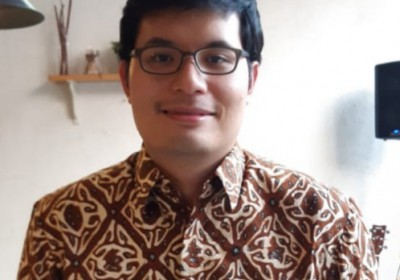Selected Speaker for IDF 2019: Alwin Adityo Learns How Vietnam Aggressively Attracts Foreign Investment
November 14, 2019
Alwin Adityo
Indonesia needs to learn from Vietnam. The latter applies to the Free Trade Agreement (FTA) aggressively, thus is able to attract more Foreign Direct Investment. A selected speaker for IDF 2019, Alwin Adityo, concluded this in his paper entitled Igniting Foreign Direct Investment (FDI) in Indonesia through Free Trade Agreements (FTA): Learning from Vietnam’s Experience.
“As many as 33 companies left China. Twenty three moved to Vietnam, and 10 to other countries, such as Malaysia, Cambodia, and Thailand. Nobody chose Indonesia,” continued Alwin.
Alwin is a member of the Indonesian Negotiation Team in the FTA financial service trade negotiation in which Indonesia participated, such as the Regional Comprehensive Economic Partnership (RCEP) and bilateral negotiations with Australia and the European Union (EU). This background also propels Alwin to present research on the advantages of FTA in Vietnam, which is able to foster foreign investment in the country.
“Especially today, we can see many companies relocating from China to Vietnam due to the trade war between China and the United States,” said Alwin, who is a researcher in the International Banking Division, Department of Banking Research and Management of the Financial Services Authority (FSA/OJK).
President Joko Widodo also highlights the World Bank’s report, which records Indonesia’s loss in attracting foreign investment, particularly from China and Japan. As quoted from Katadata, Jokowi said he is disappointed by the underwhelming investment interests, specifically from China and Japan.
Aggressive FTAs from Vietnam
Alwin mentioned that Vietnam is aggressive in developing WTO agreements. The indicators, according to Alwin, include, first, despite only recently becoming a WTO member in 2007, Vietnam moved swiftly in preparing various trade agreements. Vietnam becomes the only country in ASEAN, besides Singapore, to enjoy privileged access to the United States (US) and European Union (EU) market. This FTA preference can be considered an important factor in improving Vietnam’s economic growth and placing the country as the center for export-oriented manufacturing.
Second, relating FTA with high quality. Alwin describes this as free trade agreements with broader discipline and negotiation scope.
“Vietnam has high-quality FTAs that makes it easier for countries to export, and this attracts investors,” said Alwin.
One of the high-quality FTAs is the Comprehensive and Progressive Agreement for Trans-Pacific Partnership (CPTPP). Investors see that investment in Vietnam will make it easier for them to export to countries in CPTPP. The fare is much cheaper than exporting from Indonesia. CPTPP oversees a number of strategic export destinations in the European Union and American continents, such as Chile, Canada, and Mexico.
“The Vietnamese Ministry of Planning and Investment predicts that CPTPP can increase its GDP by 1.3 percentage points and export by 4.0 percentage points in 2035, and generates 20,000-26,000 jobs every year,” reiterated Alwin.
So how can FTA attract investment? Alwin mentions two things. First, economic benefits. FTA can reduce export tariffs of goods from country A to country B, making the cost cheaper. In addition, FTA will decrease market access obstacles and discriminative behavior from local players in export destination countries. This will benefit export-oriented investors. Second, FTA can provide legal certainty for investors.
“Investment in a country requires large capital investment funds. Thus, there needs to be a collateral to prevent them from suffering loss in the future. For example, different policies impacting on nationalisation,” explained Alwin.
According to Alwin, FTAs, especially high-quality agreements, enable this protection.
Indonesia First Needs to Conduct Self-Mapping
Alwin said that Indonesia does need to learn from Vietnam to attract investment by using FTA. However, Indonesia also needs to consider its national interest should it wants to follow Vietnam’s footsteps.
“We need to map which sectors are ready to be exposed to foreigners and which sectors need to be exclusively for domestic actors,” he said.
Some considerations include finding sectors that require large investment costs, to which domestic investors are less interested or finding it difficult to engage in. Most importantly, these sectors need to provide a high economic multiplier effect. For example, the construction sector, even more so since infrastructure remains Indonesia’s development priority. This sector requires large amount of funds that may not be enough if only funded by domestic investors.
“Now, in the process, this will involve the financial services sector to facilitate financing the project. This means there is a multiplier effect to the Financial Services sector,” said Alwin.
According to Alwin, Indonesia also needs to be smart if it wants to be bonded with high-quality FTAs. Engagement with CPTPP has many consequences. Alwin thinks the possibility of forming ties through these FTAs needs to be explored by relevant ministries and institutions.
“Once tied, Indonesia can no longer back down,” he added.
Alwin’s presentation was conveyed in Improving the Investment Climate for Employment Creation session of the Indonesia Development Forum (IDF) 2019, on July 22. This presentation was developed from Subtheme 4: Improving the Investment Climate for Employment Creation, as a part of the main theme of IDF 2019, Mission Possible: Seizing the Opportunities for Future Work to Drive Inclusive Growth.
Indonesia’s Research Institutions Supporting the Development of the Electric Vehicle Industry
Indonesian Muslim Fashion and Cosmetics IKMs Shine at Dubai World Expo 2020
Govt Steps Up UMKM Transformation Efforts in the Midst of Pandemic Slowdown
Govt Encourages Promotion of IKM Products in Digital Era
Government Begins Developing Maritime Training Center in Makassar
Tweets by IDDevForum
